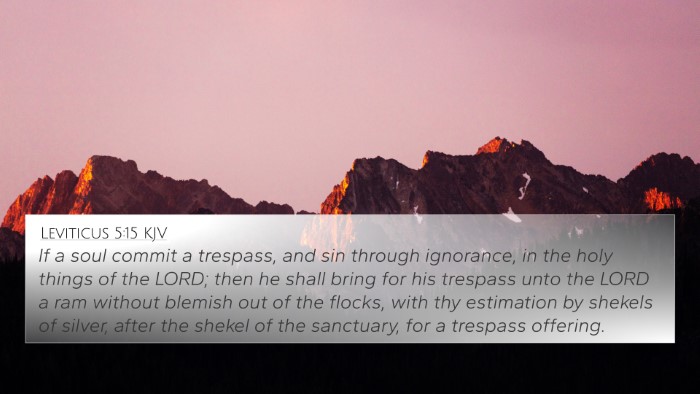Understanding Leviticus 6:6
Leviticus 6:6: “And he shall bring his trespass offering unto the LORD, for his sin which he hath sinned...”.
This passage emphasizes the importance of atonement in the Levitical laws. It serves as a reminder for individuals who have committed a trespass against God to bring an offering to Him. The notion of sin requires action; a tangible offering signifies sincere repentance and acknowledgment of one's wrongdoings.
Context and Significance
The book of Leviticus is essential for understanding the sacrificial system of the ancient Israelites. The laws set forth in Leviticus inform the community how to remain in good standing with God.
-
Matthew Henry's Commentary:
Henry notes that the trespass offering is not just a ritual; it symbolizes repentance, and it is mandated when a person has been unfaithful or wronged another.
-
Albert Barnes' Notes:
Barnes highlights that the necessity of an offering reflects the seriousness with which God regards sin, as it disrupts the covenant relationship. The process of bringing an offering emphasizes personal accountability and the need for governmental intervention in moral and spiritual failing.
-
Adam Clarke's Commentary:
Clarke posits that the act of bringing a trespass offering is an acknowledgment of sin, not only before God but also among the community. The offering restores relationships both with God and fellow humans.
Thematic Connections
Leviticus 6:6 serves as a pivotal verse that connects with several themes throughout Scripture, particularly around sin, atonement, and repentance. Below are cross-references that further elucidate these themes:
- Exodus 30:12-16: Discusses the atonement money for the redemption of the soul.
- Psalms 51:17: “The sacrifices of God are a broken spirit; a broken and contrite heart.” This verse accentuates that true repentance is far more pleasing than ritualistic offerings.
- Isaiah 53:5: Points to the sacrificial nature of the servant who bears our iniquities, foreshadowing Christ’s ultimate sacrifice.
- Luke 19:8: Zacchaeus demonstrates repentance by promising restitution, illustrating the principles outlined in Leviticus.
- Hebrews 9:22: “Without the shedding of blood, there is no remission of sin,” emphasizing the necessity of sacrifice for forgiveness.
- 1 John 1:9: Assurance that if we confess our sins, He is faithful to forgive, reinforcing the ongoing relevance of personal accountability in faith.
- James 5:16: “Confess your sins to one another, and pray for one another, that you may be healed.” This verse illustrates the communal aspect of confession and reconciliation.
- Romans 3:25: Refers to Jesus' sacrifice as a propitiation, which relates to the concept of the trespass offering in Leviticus.
- 2 Corinthians 5:21: Highlights that Christ became sin for us, thus reconciling our need for trespass offerings through His finished work.
- Philippians 4:18: Paul speaks about offerings made to support ministry work, echoing the importance of offering as an act of worship.
Applying the Insights
In modern Christian practice, Leviticus 6:6 calls believers to understand the weight of sin and the importance of seeking reconciliation with God and others. It invites reflection on:
- How do we respond to our own sins?
- What does repentance look like in our community?
- How does our understanding of sacrificial offerings translate into our daily lives?
Tools for Cross-Referencing
For those looking to dive deeper into scriptural connections and themes, several tools can enhance your study:
- Bible Concordance: Helps in locating specific verses and understanding their contexts.
- Bible Reference Resources: Such tools include commentaries and thematic Bibles for comprehensive analysis.
- Cross-Referencing Bible Study Methods: Includes strategies like reading parallel passages or using thematic guides.
- Bible Cross-Reference Guide: Provides visual aids to track interconnected themes across the scriptures.
Conclusion
The exploration of Leviticus 6:6 through various commentaries and scriptural references invites a deeper understanding of the gravity of sin and the necessity of atonement in the believer's life. Engaging with these themes offers a pathway to genuine repentance and restored relationships with God and others.





